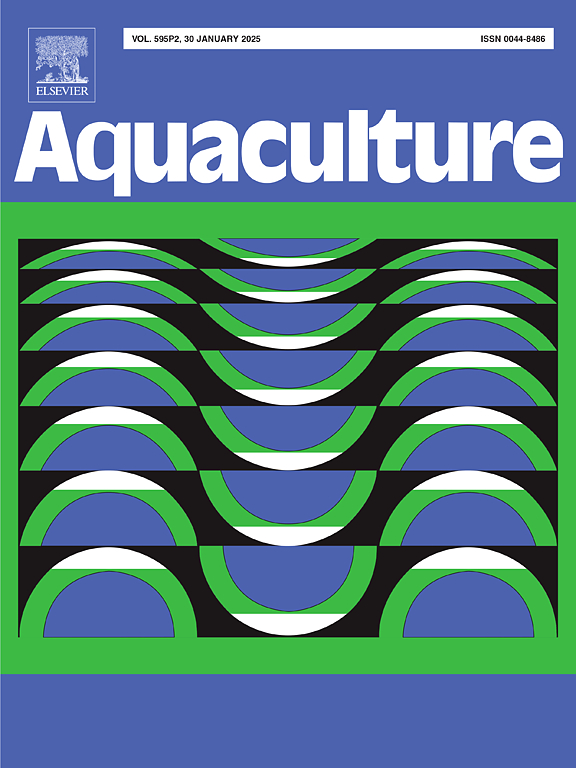豆粕-精制处理通过微生物代谢功能重塑减轻高豆粕饮食引起的小龙虾肠道氧化损伤
IF 3.9
1区 农林科学
Q1 FISHERIES
引用次数: 0
摘要
鱼粉的高成本和不可靠的供应引发了人们对低鱼粉饲料的担忧,使大豆衍生蛋白受到越来越多的关注。然而,饲粮中添加高豆粕(SBM)会对宿主的生长、健康状况和肠道微生物代谢功能产生负面影响,这促使人们寻找新的大豆衍生蛋白来源来替代SBM。因此,本试验旨在研究发酵豆粕和浓缩大豆蛋白替代豆粕对小龙虾生长、肠道组织形态、抗氧化能力和非特异性免疫的影响,并探讨微生物调控的代谢机制。选取600只(4.00 g)小龙虾,随机分为鱼粉、豆粕、豆粕和SPC 4个处理,分别饲喂鱼粉和3种不同的大豆蛋白饲料,为期6周。本研究结果表明,饲粮中添加FSM和SPC可减轻SBM日粮引起的生长下降和肠道损伤,表现为绒毛、上皮发育良好,结缔组织致密,血淋巴丙二醛和乳酸含量降低(P <;0.05)。此外,与SBM组相比,添加FSM和SPC饲料的小龙虾免疫力增强,血淋巴溶菌酶和酸性磷酸酶水平升高(P <;0.05), nfkb和alf mRNA表达水平降低(P <;0.05)。此外,饲喂FSM和SPC的小龙虾肠道谷胱甘肽含量和nrf2 mRNA表达水平均升高(P <;0.05)。此外,饲粮中添加FSM和SPC可消除sbm诱导的微生物生态失调和功能障碍,其特征是柠檬酸杆菌和厌氧菌减少,RsaHf231增加。进一步研究发现,SBM组与FM和SBM精制组共有88种差异微生物和66种差异代谢物,其中候选杆菌、蓝藻PCC-6307和Vogesella以及磷脂酰胆碱是小龙虾健康的主要贡献菌。此外,膳食sbm精制处理有助于更强大和复杂的微生物共发生网络,并激活氨基酸代谢相关途径。综上所述,饲粮中添加FSM和SPC可通过重塑微生物代谢功能,扭转豆粕日粮小龙虾免疫力和抗氧化能力下降的趋势,从而改善小龙虾的生长和肠道组织形态结构。本文章由计算机程序翻译,如有差异,请以英文原文为准。
Soybean meal-refined treatment mitigated high soybean meal diet-induced oxidative damage in the gut of crayfish via microbial metabolic function remodeling
The high cost and unreliable supply of fishmeal has stimulated concern over low fishmeal feed, making soy-derived protein receive more attention recently. However, dietary supplementation with high soybean meal (SBM) negatively affects host growth, health status, and gut microbial metabolic functions, encouraging the search for novel soy-derived protein sources to replace SBM. Accordingly, this experiment was designed to investigate the effects of replacing SBM with fermented soybean meal and soy protein concentrate on the growth, gut histomorphology, antioxidant capacities, and non-specific immunity of crayfish, together with the underlying metabolic mechanisms of microbial regulation. 600 crayfish (4.00 g) were randomized into four treatments (FM, SBM, FSM, and SPC) and fed diets with fishmeal and three different soy-derived proteins for six weeks. The present findings revealed that dietary FSM and SPC inclusion mitigated the growth decline and intestine injury caused by the SBM diet, as evidenced by the well-developed villus, epithelium, and dense connective tissue, as well as lower hemolymph malondialdehyde and lactic acid contents (P < 0.05). Moreover, crayfish supplemented with FSM and SPC diets experienced enhanced immunity compared to the SBM group, together with the increased hemolymph lysozyme and acid phosphatase levels (P < 0.05), and the decreased nfkb and alf mRNA expression levels (P < 0.05). Also, crayfish given FSM and SPC diets exhibited increases in the intestine glutathione content and nrf2 mRNA expression level (P < 0.05). Furthermore, dietary FSM and SPC supplementation eliminated SBM-induced microbial dysbiosis and dysfunction, characterized by the decreased Citrobacter and Anaerorhabdus and increased RsaHf231. Further findings revealed that the identified 88 differential microbes and 66 differential metabolites were shared between the SBM group and the FM and SBM-refined groups, with Candidatus Bacilloplasma, Cyanobium PCC-6307, and Vogesella, and phosphatidylcholine being the main contributors to crayfish health. Moreover, dietary SBM-refined treatment contributed to more robust and complicated microbial co-occurrence networks and activated amino acid metabolism-related pathways. To conclude, dietary FSM and SPC supplementation reversed the weakened immunity and antioxidant capacities of crayfish given a soybean meal diet by reshaping microbial metabolic functions, which in turn improved the growth and gut histomorphological structure.
求助全文
通过发布文献求助,成功后即可免费获取论文全文。
去求助
来源期刊

Aquaculture
农林科学-海洋与淡水生物学
CiteScore
8.60
自引率
17.80%
发文量
1246
审稿时长
56 days
期刊介绍:
Aquaculture is an international journal for the exploration, improvement and management of all freshwater and marine food resources. It publishes novel and innovative research of world-wide interest on farming of aquatic organisms, which includes finfish, mollusks, crustaceans and aquatic plants for human consumption. Research on ornamentals is not a focus of the Journal. Aquaculture only publishes papers with a clear relevance to improving aquaculture practices or a potential application.
 求助内容:
求助内容: 应助结果提醒方式:
应助结果提醒方式:


